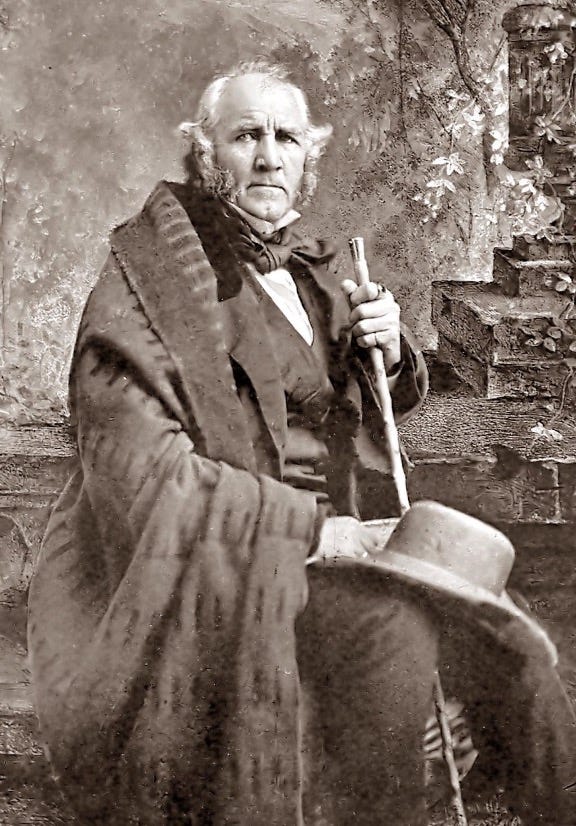Profiles in Cravenness: The Enduring Shame of Cornyn and Cruz
“Senators, I knew Sam Houston. Sam Houston was a friend of mine. And Senators, you’re no Sam Houstons.” -- Texas
(Welcome to another installment of Life Its Own self. If you enjoy reading it, please let me know by 1) hitting the Like button at the bottom, 2) subscribing to this newsletter, and 3) recommending it to others. Also, feel free to comment below. I’d love to hear your thoughts.)
Someday, if the United States of America still exists, books will be written about the crisis of democracy we now face. One of the themes of those books will be the craven cowardice and lack of patriotism of the Republican members of the U.S. Senate, the self-styled “World’s Greatest Deliberative Body.” And among the villains of the stories, certainly, will be both of Texas’s Senators, John Cornyn and Ted Cruz.
Thirty-four Texans have served in the United States Senate, all of them white, only one of them female[i]. Probably, and deservedly, you could only name one or two of them, and none before the middle of the last century – except for Sam Houston.[ii]
A TEXAS PROFILE IN COURAGE: Sam Houston
Sam Houston is surely one of the most fascinating characters in American history. Raised among Cherokee Indians. Army general and protégé of Andrew Jackson. Elected Congressman from and then governor of Tennessee, he left that state at the height of his powers and popularity and moved to Texas.
In Texas, he was the Right Man for the Moment, becoming both a political and military leader of the Texian rebellion against Mexico. In the spring of 1836, he organized the Convention that drafted the Texas Declaration of Independence and was one of its signatories. The Convention also named him Commander-in-Chief of the Texian army, such as it was. He fought the Mexican dictator Antonio Lopez de Santa Anna, defeating his army decisively at the Battle of San Jacinto on April 21, 1836.
Houston was wounded, but Santa Anna was captured, and Houston made him sign the Treaties of Velasco, recognizing Texas independence. [iii]
Houston’s leadership during the Texas Revolution made him the natural choice to be the Republic of Texas’s first President. During the nine years of Texas as an independent nation, he worked for Texas’s admission to the Union, which was complicated by the national debate over slavery.
When Texas was admitted as a state in 1845, the Legislature selected Sam Houston as one of the state’s first two senators. In 1854, he enraged his constituents by voting against the Kansas-Nebraska Act, which would undo the Missouri Compromise and significantly elevate the temperature of the national debate over slavery. For his perfidy, he was recalled by the Legislature. A few years later, though, he was elected Governor, taking office in December 1859. After Abraham Lincoln was elected President in 1860, Houston focused his energies on keeping Texas in the Union. Nonetheless, the state seceded in February 1861. When Houston refused to take an oath of loyalty to the Confederacy he was removed as Governor. It was the end of his political career. These two actions were immortalized in John F. Kennedy’s Profiles in Courage, for which he won the Pulitzer Prize.[iv] He was the only Texan included.
PROFILES IN CRAVENNESS: John Cornyn and Ted Cruz
Ted Cruz and John Cornyn are an odd couple. Cruz is loud and mercurial, compelled to brash statements and attention-grabbing gestures. He seems to be constantly hopped up on Adderall. Cornyn is stylistically the opposite, having cultivated for all his public life the impression of a thoughtful, reflective man. As a result, he appears to be doped out on quaaludes all the time.
But both have demonstrated, among their other inadequacies, a feckless, lickspittle obeisance to the Mad King Donald Trump that still threatens the safety and security of Our Republic.
John Cornyn
When the senior Senator from Texas was a child, his parents dressed him up in a natty little suit and took him to see Mr. Smith Goes to Washington. They wanted him to identify with the hero of the movie, but he was transfixed by Joseph Paine, the hopelessly corrupt but urbane senator played by Claude Rains. Despite their best efforts, John Cornyn has always wanted to be Joseph Paine.
After a brief stint as a lawyer, he served for a decade as a district judge in San Antonio and on the Texas Supreme Court before being elected Attorney General in 1998. His four years in that office are marked only by the fact he was not a crook like his predecessors nor a performative asshat like his successors. He went to the Senate in 2002, where he will remain forever. He is the ultimate beneficiary of the Welfare State Texas has created for its GOP statewide elected officials.
Cornyn’s Senate career has been undistinguished, despite the fact he’s held leadership roles in the Republican caucus. There are no major pieces of legislation named after him – no McCain-Feingold, no Dodd-Frank – and there never will be. John Cornyn’s destiny is to be a reliable apparatchik in the Senate GOP caucus, which means he’s spent most of the last six years defending Donald Trump’s assault on the Constitution. He voted twice against convicting the only President in U.S. history who was impeached twice. After issuing a public statement in support of a 9/11-style commission to investigate the events of January 6th, he voted against that proposal.
Just this week, he criticized the FBI’s execution of a search warrant at Mar-a-Lago, saying the purported reasoning for the action was “thin gruel.” He has not taken the opportunity “to revise and extend his remarks,” as they say, since it was revealed that Trump had absconded from the White House with super-super-secret nuclear documents and lied repeatedly about it.
Still, Cornyn would probably take offense at being lumped in with Cruz, who, like all his colleagues in the Senate, he loathes.
Ted Cruz
The case against Cruz is the easier one to make: he’s been in the Senate for ten years now, and is widely regarded as its biggest pain the ass. Senator Lindsey Graham (R-SC) famously said, “If you killed Ted Cruz on the floor of the Senate, and the trial was in the Senate, nobody would convict you.” As New York Times reporter Mark Liebovich says in his history of the Trump years, Thank You For Your Servitude: Donald Trump’s Washington and the Price of Submission, Cruz
in short order proved he had zero interest in achieving the kind of things senators had traditionally prided themselves on, like passing laws, getting committee assignments, and earning the respect of colleagues … Becoming a maximum nuisance was far more productive for his purposes.
After Donald Trump lost the 2020 election – which, by the way, wasn’t even close, either in the popular vote or the Electoral College – he conspired with others to plan and execute a coup against the United States government in order for President Trump to remain in power. Cruz gladly became part of the effort to question, and then overturn, the election results. He volunteered to participate in two lawsuits (one a farcical case brought by Texas AG Ken Paxton asking the Supreme Court to throw out all the votes in Georgia, Pennsylvania, Michigan and Wisconsin, pretty much on the grounds that those people voted wrong), but both cases were thrown out of court before his mettle as a litigator could be proven.
Senator Cruz was also neck deep in the efforts to overturn the election, up to and including a role in an attempted coup d’etat. From Election Day until January 6th, Cruz was working behind the scenes and, when possible, in front of the cameras to frustrate the peaceful transfer of power. He embraced, promoted, and disseminated spurious legal arguments. He bludgeoned state legislators and browbeat fellow Senators to go along with constitutionally dubious plots to sabotage the peaceful transfer of power. The full account of his treachery is only now coming to light, but it does not reflect well on him or the state he purports to represent.
Many Texans have not forgotten that a month later, exhausted from his efforts to overthrow the Constitution and the will of the people, Ted Cruz lit out for Mexico just as people were freezing to death in the wake of a devastating power failure across most of the state.
Last Monday when FBI agents executed their search of the Mar-a-Lago property, Cruz predictably and hysterically overreacted. The FBI action was “unprecedented,” “corrupt and an abuse of power.” He continued, “the American people deserve to know why Biden is using the FBI as his political enforcers. Tin-pot dictators do that, but that’s not how America works.”
Like his colleague, he has not spoken out since the cascading revelations that Trump was not only harboring national secrets, but going to great lengths to hide them and lie to the FBI about them. In the process, Trump and his surrogates lied repeatedly to the American people, which used to be frowned upon around here.
In fairness to these scoundrels, they behaved only as badly as all the other members of the Senate GOP caucus, and no worse than the Unholy Trinity of Texas Bad Government: Abbott, Patrick, and Paxton.
Texans should seriously wonder how it is that a people whose first U.S. Senator was Sam Houston should have sunk to the point where they have bestowed the honorific “Senator” on these two.
[i] Kay Bailey Hutchison, who served from 1993 to 2013.
[ii] In the modern era, Lyndon Baines Johnson stands out from the pack, because of his consequential presidency but also because he transformed the way the U.S. Senate operated during his stint as Majority Leader from 1955-1961.
[iii] The treaties were repudiated by the Mexican Congress, on the not unreasonable grounds that Santa Anna was a prisoner when he negotiated them. They also stripped Santa Anna of his presidency.
[iv] There is controversy over to what extent, and how, John Kennedy “authored” Profiles in Courage. His speechwriter, Ted Sorenson, collaborated with him on the book.








"Once you give up your integrity, the rest is a piece of cake."
J.R. Ewing
Speaking of if a Senator dies on the Senate floor, if Cornyn dies on the Senate floor it might be days before anyone would notice, nor should they necessarily.